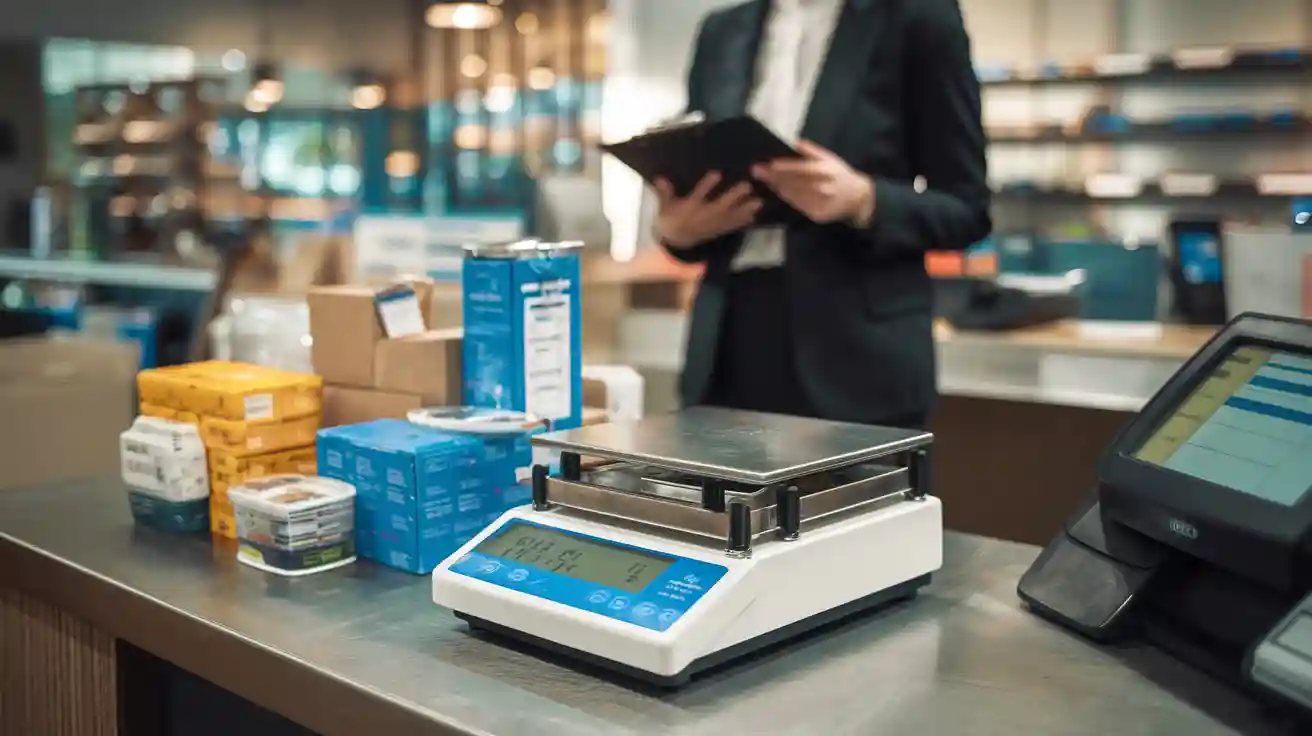A commercial scale is an essential tool for any business that needs precise product measurements. These scales come in various types, including bench scales, floor scales, counting scales, and crane scales. Common features include digital displays, tare functions, and easy-to-clean surfaces, designed to support accurate and efficient daily operations. In this article, you’ll learn what a commercial scale is, the types available, and how businesses use them to improve efficiency and accuracy in daily operations.

What is a Commercial Scale?
Definition and Features
A commercial scale is a type of measuring equipment designed for use in business transactions. Businesses use commercial scales to weigh goods that are sold by weight, such as produce, meat, or bulk items. These scales must meet strict standards for accuracy and reliability.
Commercial scales often include digital displays, easy-to-clean surfaces, and user-friendly controls. Many models feature advanced functions like tare, unit conversion, and price calculation. These features help businesses operate efficiently and ensure customers receive fair value.
The table below highlights key features that set commercial scales apart from other weighing devices:
| Feature | Commercial Scales | Other Weighing Devices |
|---|---|---|
| Intended Use | Used in transactions where items are sold | Used in various applications, not always for sale |
| Certification | Must be ‘Legal for Trade’ or ‘NTEP Certified’ | May not require such certifications |
| Regulation | Regulated by the National Bureau of Standards | Less stringent regulations |
| Accuracy Requirements | Specific accuracy requirements for trade | Focus on achieving high accuracy, but not for trade |
| Typical Locations | Deli counters, candy stores | Industrial settings |
Commercial vs. Industrial Scales
Commercial scales and industrial scales serve different purposes. Commercial scales focus on transactions where accurate weight determines price. These scales appear in retail stores, markets, and food service businesses.
Industrial scales handle heavier loads and often operate in manufacturing or shipping environments. They may not require the same certifications as commercial scales, but they must deliver high accuracy for production and quality control.
The main differences between these two types of scales include their intended use, certification requirements, and typical locations. Commercial scales must meet legal standards for trade, while industrial scales prioritize durability and capacity.
Businesses face several challenges when using commercial scales. Inconsistent measurements can result from uneven flooring, external vibrations, or worn-out components. Environmental factors like dust, moisture, and temperature changes may also affect performance. Overloading the scale can cause damage and lead to inaccurate readings, so regular inspections and maintenance are essential.
Types of Commercial Scales
Bench Scales
Bench scales offer compact and versatile solutions for many businesses. Companies use these commercial scales for weighing small packages, ingredients, or components. Bench scales appear in retail stores, laboratories, and food production facilities.
| Industry | Application Description |
|---|---|
| Manufacturing and Quality Control | Weighing components to ensure compliance with weight specifications. |
| Warehouses and Logistics | Accurate weighing for inventory tracking and shipment management. |
| Food and Beverage Industry | Precise portioning and quality assurance in food production. |
| R & D and Laboratories | Weighing chemicals and materials with high accuracy for experiments. |
| Maritime Industry | Determining cargo weight for safety and compliance before loading onto vessels. |
These commercial scales help businesses maintain accuracy and efficiency in daily operations.
Floor Scales
Floor scales handle heavy-duty weighing tasks. Businesses rely on these commercial scales for weighing large pallets, crates, or livestock. Floor scales are commonly used in manufacturing plants, warehouses, and agricultural settings.
- Retail and commercial businesses use floor scales for stock management.
- Agriculture relies on floor scales for weighing livestock and feed.
- Factories and warehouses use floor scales to weigh oversized crates and pallets before shipping.
Floor scales support commercial scales in environments where durability and capacity matter most.
Counting Scales
Counting scales play a key role in inventory management. These commercial scales count large quantities of small items, such as screws, pills, or electronic parts. Retailers and manufacturers use counting scales to improve accuracy and save time.
| Benefit | Description |
|---|---|
| Improved Accuracy | Reduces human error, ensuring precise counts, which boosts efficiency and profitability. |
| Time Savings and Efficiency | Speeds up the counting process, saving valuable time compared to manual methods. |
| Cost Reduction | Minimizes overstock and stockouts, saving costs and reducing losses due to discrepancies. |
| Enhanced Record Keeping | Facilitates better record keeping and reporting, enabling informed decision-making. |
Counting scales are essential for commercial scales in retail, warehousing, and production processes.
Crane Scales
Crane scales weigh heavy objects that hang from a hook. These commercial scales are often used in manufacturing, shipping, and construction. Crane scales must meet strict safety standards, including proper installation, regular maintenance, and operation by trained personnel.
Crane scales support industries that handle large or awkward loads, making them different from industrial scales that sit on the floor.
BUY COMMERCIAL WEIGHING SCALES HERE
Uses of Commercial Scales in Business

Retail and Point-of-Sale
Retail businesses rely on commercial scales to ensure accurate pricing for products sold by weight. These scales are used in grocery stores, butcher shops, and markets to weigh items sold by weight, such as produce or meat. Many commercial scales integrate with point-of-sale systems and barcode scanners, allowing seamless transactions and efficient inventory management.
- Commercial scales with wireless capabilities connect to POS systems for real-time data integration.
- Self-service weighing scales let customers weigh and label their own items, improving convenience.
- NTEP legal-for-trade certification ensures compliance and builds customer trust.
| Benefit/Feature | Description |
|---|---|
| Reduces Human Error | Digital counting scales minimize mistakes that occur during manual counting. |
| Streamlines Inventory Processes | They save time and reduce labor costs associated with inventory management. |
| Enhances Accountability and Transparency | Improved accuracy leads to better tracking and management of inventory levels. |
| Integrates with Software | Many scales can connect with inventory management systems, reducing paperwork and improving traceability. |
Accurate commercial scales help retailers avoid pricing errors and maintain compliance with trade regulations.
Shipping and Logistics
Shipping and logistics companies use commercial scales to determine the exact weight of parcels and freight. Reliable measuring equipment prevents overpayment for shipping and speeds up the fulfillment process. Accurate weight measurements ensure fair charges for customers and help businesses avoid disputes.
Investing in advanced commercial scales reduces the risk of fines, delays, and extra shipping costs. These scales optimize shipping costs and improve customer satisfaction. Industrial scales also play a role in logistics, especially for larger shipments.
Commercial scales streamline operations by providing precise weights for inventory and shipping documents. This accuracy supports compliance with industry standards and regulations.
Food Service and Hospitality
Food service businesses depend on commercial scales to maintain portion control and reduce waste. Portion scales help chefs and kitchen staff serve consistent meal sizes, which keeps food costs within target ranges. Over-portioning leads to higher expenses and increased food waste.
- Commercial scales help restaurants keep food costs at 30-40% of the selling price.
- Accurate portioning reduces waste, which improves profitability.
- Many food service businesses use commercial scales in production processes to ensure quality and consistency.
Restaurants and cafeterias benefit from commercial scales by serving customers fairly and meeting health standards.
Agriculture and Farming
Agricultural operations use commercial scales to weigh livestock, feed, and harvested crops. Accurate scales and records are required for all transactions in farming. Scale tickets must include details such as the date, weighing agency, seller and buyer identification, type and weight of livestock, and the name of the weigher.
- Farmers must maintain accurate commercial scales and records for compliance.
- Scale tickets must show the date, agency, seller, buyer, livestock details, and actual weight.
- Feed weighing tickets must include agency, producer, person weighing, location, and weights.
- Additional details may be added, but these are mandatory for legal compliance.
Stockyard owners and dealers must test their commercial scales at least twice each year, with a minimum of 120 days between tests.
Commercial scales in agriculture support fair transactions and help farmers meet regulatory requirements. Industrial scales are also used for weighing large loads, but commercial scales focus on legal compliance and transaction accuracy.
Conlusion
Commercial scales play a vital role across multiple industries, ensuring precise weight measurements, legal compliance, and operational efficiency. By supporting accurate pricing, portion control, inventory management, and transaction transparency, these scales protect businesses and customers alike. Investing in reliable commercial scales enhances productivity, minimizes errors, and ensures fair trade, making them indispensable for modern business operations.
BUY COMMERCIAL WEIGHING SCALES HERE
